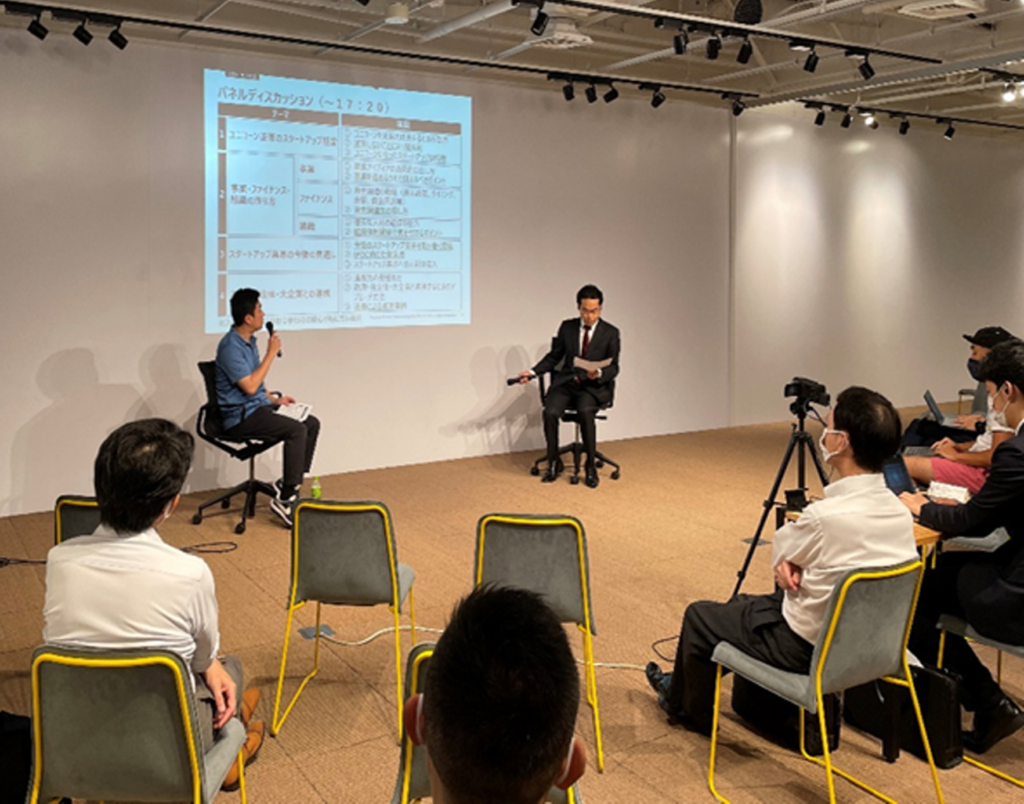


The Tokyo Consortium will hold its first event of the year on July 2022, 7, targeting startups and various players who support startups (companies, VCs, universities, local governments, etc.) to help startups become unicorns. We held the "Event to Create Momentum for Creating a Unicorn-Class Company" to deepen understanding of the necessary elements, approaches, support, etc. On the day of the event, we invited Mr. Yoo Nagami, director and CFO of Raxul Co., Ltd., for a panel discussion. A total of 4 people participated in this event, both online and offline, and we received many positive comments.

When looking at unicorns, having a vision is paramount. I don't believe that unicorns are the only correct answer, as there are many great small and medium-sized businesses and local businesses in Japan. However, if you really want to become a unicorn, you first need to have a big vision.
It is important to learn business models from the past and from other companies. Especially when it comes to how we receive money, there are trends, and there is a lot we can learn from the past. Your vision and business model should be quite unique, and in fact, it's best if you are original, but there are certain patterns when it comes to how you get paid. After thoroughly studying the business models that our predecessors have used in the past, there are several typical ways to receive money, so you can combine them. I think it is important to receive money from people when starting a business.
Regarding capital policy, we believe it is important to seek advice from management after a company goes public. How to set up your capital policy, for example, what should be the pace of each dilution, how to set a valuation, how to approach the VC staff, how to negotiate, and be careful about the terms of the contract. The people who have the most knowledge about what needs to be done are managers who have just gone public or have just gone public. In the world of startups, there is a culture in which successful people give back, and from the startups' perspective, it has been important to utilize the knowledge of their predecessors.
When a startup hires new talent, I think it is necessary to send a message that is both exciting because the company has a bright vision and a sense of sadness that urges the company to get involved right away and help. Also, I think it depends on the phase, but I think it's not in keeping with the times that salaries are much lower because you're a startup. I think it is important to demonstrate financially that the new challenge of jumping into a startup will bring happiness, including the upside of stock options.
You also need to show that you can drive personal growth in addition to emotional and financial aspects. It is important that the person's own career and the growth of the company are both driven by the same. Even at Raksul, I gave explanations like ``I want you to do this kind of work'' and ``This is the kind of career you can get after that.''
Japan has the former Mothers market and the current Growth market, and in terms of size, it is easier to list than other countries. On the other hand, this is also a factor that prevents companies from growing while they are unlisted. Investment from institutional investors is important for startups to increase their performance and market capitalization. Institutional investors need to buy and sell at the same time, so they need a certain size of market capitalization and liquidity to buy and sell. If the market capitalization does not reach a certain level, institutional investors will not come in and the company will not scale, resulting in a bad spiral. In order to prevent such a situation, it is necessary to expand business performance and increase corporate value while unlisted, and to raise funds on the same scale as when listed on the growth market while unlisted. Originally, I have the impression that Japanese startups raise funds at the early to middle stages of series A, B, and C when they are unlisted. Nowadays, some companies have series F and G. Currently, we are in an environment where it is possible to persist through multiple rounds of procurement, so we should be aware of this.
Both the utilization of services and the relaxation of regulated industries are important for collaboration with the government.
First of all, I would like people to use the startup's services. I would like people to use a variety of services from startups, so that as a user they can understand what's good about them, or give feedback on what's not good about them.
Next is deregulation. Of course, there are some bills that need to be passed, but it is extremely important that we take action together to change regulations and tax systems that startups feel are bottlenecks where possible. .
●For inquiries regarding this matter:
Tokyo Consortium Management Office tokyo_consortium@tohmatsu.co.jp
Management Trustee: Tohmatsu Limited Liability Audit Corporation
Reception/Answer time: 10:00-17:00 (excluding Saturdays, Sundays, and holidays)